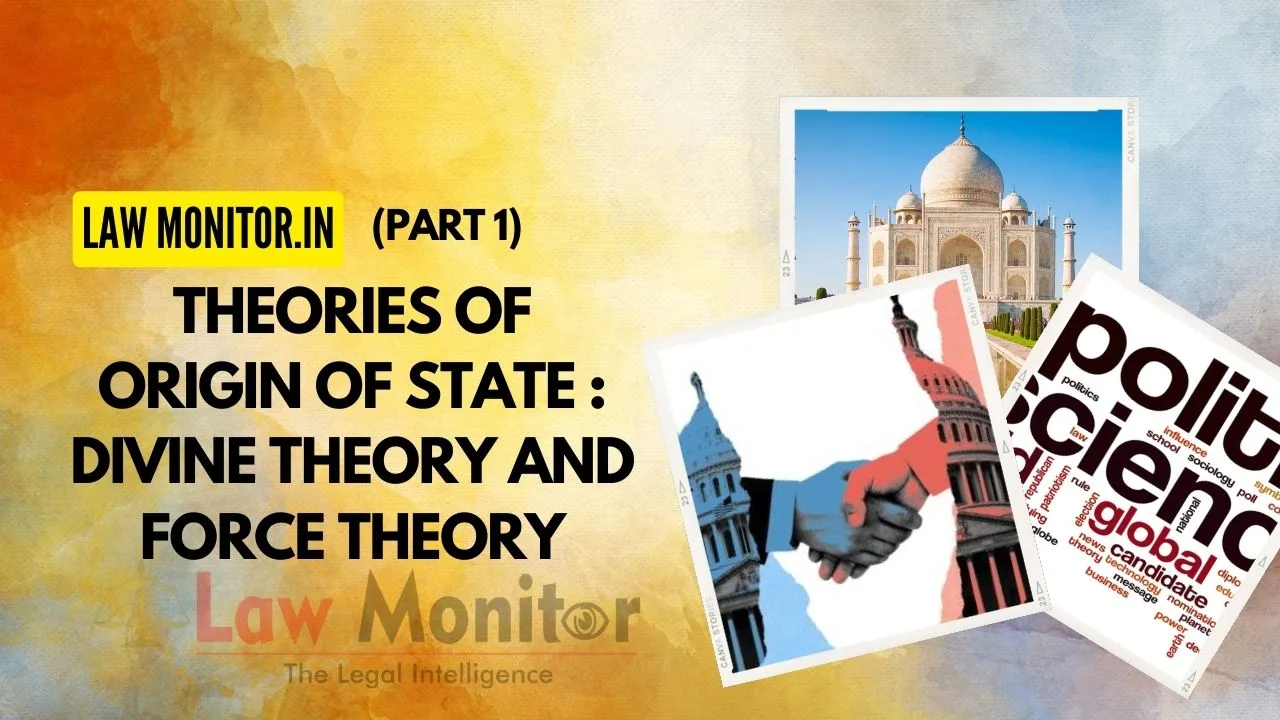Theories of Origin of State (Part 1): Divine Theory and Force Theory
As a community of persons, permanently occupying a definite territory, legally independent of external control, and possessing an organized government that creates & administrates law over all persons and groups within its jurisdiction is a ‘State”.
State and its origin
- Unlike natural Science, we cannot be certain and exact in estimating the date of origin of the state.
- It, therefore, compels us to know the various propositions regarding the origin and hence so many theories telling their own ways
Theories of the Origin of State
- Divine origin theory;
- Force Theory;
- Social Contract Theory;
- Patriarchal Theory & Matriarchal Theory;
- Historical/Evolutionary theory; and
- Marxist Theory
1. THE DIVINE THEORY
- The State was created by God and governed by His deputy or vicegerent ( The King) .
- He (God) sent His deputy to rule over them.
- The ruler was a divinely appointed agent and he was responsible for his actions to God alone.
- As the ruler was the deputy of God, obedience to him was held to be a religious duty and resistance a sin.
Divine right theory…
- Nobody could limit his will and restrict his power.
- His word was law and his actions were always just and benevolent.
- To complain against the authority of the ruler and to characterize his actions as unjust was a sin for which there was divine punishment.
Criticism
- The divine rights of kings /Monarchy is divinely ordained and the King draws his authority from God.
- Monarchy is hereditary and it is the divine right of a King that it should pass from father to son.
- The King is answerable to God alone and resistance to the lawful authority of a King is a sin.
2. Force Theory
- It emphasizes the origin of the State in the subordination of the weak to the strong.
- A person physically stronger can capture and enslaved the weak. Having increased the number of his followers, over whom he exercised undisputed authority, he became a tribal chief.
Implications Of The Theory Of Force:
- Force is not only a historical factor but is a present essential feature of the State
- The States were born of force only
- Power is their justification and raison d’être
- The maintenance and extension of power within and without is the sole aim of the State.
Note: –
- Individualists & anarchists believe that the State is evil because of their desire for individual freedom.
- Socialists believe that the state resulted from the aggression and exploitation of labourers by capitalists and attacks, not the idea of the state itself.
Criticism:-
- Stephen Butler Leacock- “The theory errs in magnifying what has been only one factor in the evolution of society into the sole controlling force.” A state may be created by force temporarily. But to perpetuate it
something more is essential. - the theory of force runs counter to the universally accepted maxim of Thomas Hill Green- “Will, not force, is the basis of the state.” No state can be permanent by bayonets and daggers. It must have the general voluntary acceptance by the people.
- the theory of force is inconsistent with individual liberty. The moment one accepts that the basis of a state is force, how can one expect liberty there? The theory of force may be temporarily the order of the day in despotism as against democracy.
- the doctrine of survival of the fittest which is relied upon by the champions of the force theory has erroneously applied a system that is applicable to the animal world to human world. If force was the determining factor, how could Mahatma Gandhi’s non-violence triumph over the brute force of the British Imperialists?
- We may conclude with the words of R. N. Gilchrist- “The state, government and indeed all institutions are the result of man’s consciousness, the creation of which have arisen from his appreciation of a moral end.”
Next Notes:
Social Contract Theory : Theories of Origin of State (Part 2)



